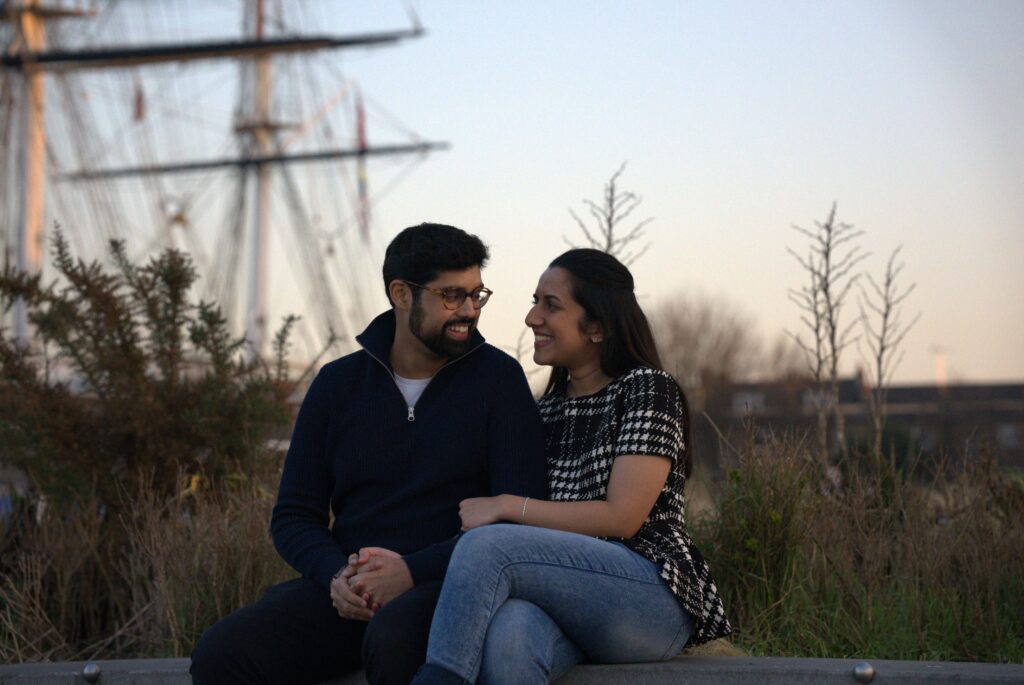
Physical intimacy when you’re engaged, haram or permissible?
August 11, 2025

Is Physical Touch and Kissing Permissible During Engagement?
Having sex before marriage is strictly haram in Islam but what about other things? There is a lot of nuance to physical intimacy and sometimes lines can get blurred, if you know that you are marrying someone does this mean certain acts of intimacy are allowed? What physical boundaries should be maintained during engagement according to Islamic teachings? Let’s dive into it.


Looking for your soulmate?
You won’t find your soulmate on this blog post but you might find them on Muzz - the world’s biggest Muslim dating and marriage app.
Watch our CEO address this and more in this video ⬇️
Understanding the Islamic Position on Pre-Marital Physical Contact
In Islam, the engagement period (khitbah) is distinct from marriage (nikah). This distinction is crucial for understanding permissible boundaries:
The fundamental principle: Islam permits physical contact between non-mahrams (those eligible to marry) only after the marriage contract (nikah) is completed – not during engagement.
Most Islamic scholars across major schools of thought (Hanafi, Maliki, Shafi’i, and Hanbali) agree that:
- Engagement is a promise to marry, not a marriage itself
- Until the nikah is completed, the couple remains non-mahrams to each other
- Physical boundaries that apply between non-mahrams continue to apply during engagement
Why These Boundaries Exist
These guidelines aren’t meant to make life difficult but rather serve several important purposes:
- Protecting dignity and honor: The Prophet Muhammad ﷺ emphasised respecting boundaries that protect one’s honor.
- Preventing gradual escalation: Physical touch often leads to increasing desire for more intimate contact.
- Avoiding regret: If the engagement ends (which is permissible in Islam), having maintained physical boundaries prevents potential regret and ensures no one is put in a position where they feel like they gave away a part of themselves that they wanted to save for their husband or wife.
- Building a foundation beyond physical attraction: The engagement period is valuable for developing communication and understanding beyond physical desire. When two people become engaged there can be a lot of lust, removing the physical aspect of a relationship allows you to see whether this person is truly the one for you beyond any physical attraction, do you have things to talk about? Do you enjoy the same activities? The non-physical things are what keep a relationship going after the honeymoon, lust phase has run it’s course.
Common Misunderstandings About Engagement
Misunderstanding #1: “Engagement makes some physical contact permissible”
While engagement is a serious commitment toward marriage, it doesn’t change the ruling on physical contact. The Islamic position is that physical intimacy becomes permissible only after the nikah contract.
Misunderstanding #2: “If we’re definitely getting married soon, it doesn’t matter”
The intention to marry doesn’t alter the Islamic ruling. Even a day before the wedding, if the nikah hasn’t been performed, Islamic boundaries remain in place. Engagement is not an Islamic loophole.
Misunderstanding #3: “Just kissing isn’t really crossing the line”
Islamic scholars point out that seemingly “minor” forms of physical contact can:
- Awaken desires that are difficult to control
- Begin a pattern of compromising on religious principles
- Create emotional and physical bonds that should be reserved for marriage

What About Looking at Each Other?
While physical touch before nikah is not permissible, Islam does encourage potential spouses to see each other before marriage:
The Prophet Muhammad ﷺ told a companion who wanted to marry a woman: “Go and look at her, for that is more likely to create love between you.” (Narrated by Ahmad, an-Nasa’i)
However, this looking:
- Should be in the presence of family members
- Doesn’t extend to physical contact
- Is limited to seeing the face and hands (according to most scholars)
Cultural Practices vs. Islamic Teachings
It’s important to distinguish between cultural practices and Islamic teachings. In some Muslim cultures:
- Engaged couples may be allowed significant freedom together
- Families might be lenient about physical boundaries during engagement
- Pre-wedding celebrations might include mixed gatherings with physical contact
However, these cultural practices should be evaluated against Islamic principles. Islamic guidance is more important than cultural norms, if the two are conflicting always go with what Islam says.
Practical Tips for Maintaining Boundaries During Engagement
If you’re currently engaged and striving to maintain Islamic boundaries but you are finding it tough; firstly remember this is completely normal and usually a good sign that you are with someone you will enjoy being married to. However, try to do these things to avoid putting yourself in a situation of temptation:
- Meet in public or family settings
- Be honest with each other about your commitment to these boundaries
- Discuss your boundaries explicitly early in the engagement
- Keep conversations and interactions purposeful rather than flirtatious; sure you can compliment one another and not necessarily have to speak the way you would with just a friend, but keeping a line there again helps to prevent any blurred boundaries
- Remind each other of your spiritual goals and the barakah (blessings) that come with following Allah’s guidance

The Rewards of Patience
The Prophet Muhammad ﷺ said: “No one leaves something for the sake of Allah but that Allah will replace it with something better.” (Ahmad)
Couples who maintain proper Islamic boundaries during engagement will usually have a deeper respect for one another due to the display they have seen of religious commitment, a stronger foundation of trust when entering the marriage, a more intense appreciation for the sanctity of their physical relationship once married and most importantly, Allah (SWT) will bring greater barakah (blessings) into their marriage.
Conclusion
While the engagement period can test one’s patience and self-control, maintaining proper Islamic boundaries ensures that your relationship begins with respect for Allah’s commands. The engagement period is a valuable time to develop communication, mutual understanding, and respect that will enrich your marriage.
Remember that Islamic boundaries aren’t restrictions but protections—they preserve the special nature of physical intimacy for marriage and build a foundation of respect and spiritual commitment between spouses.

